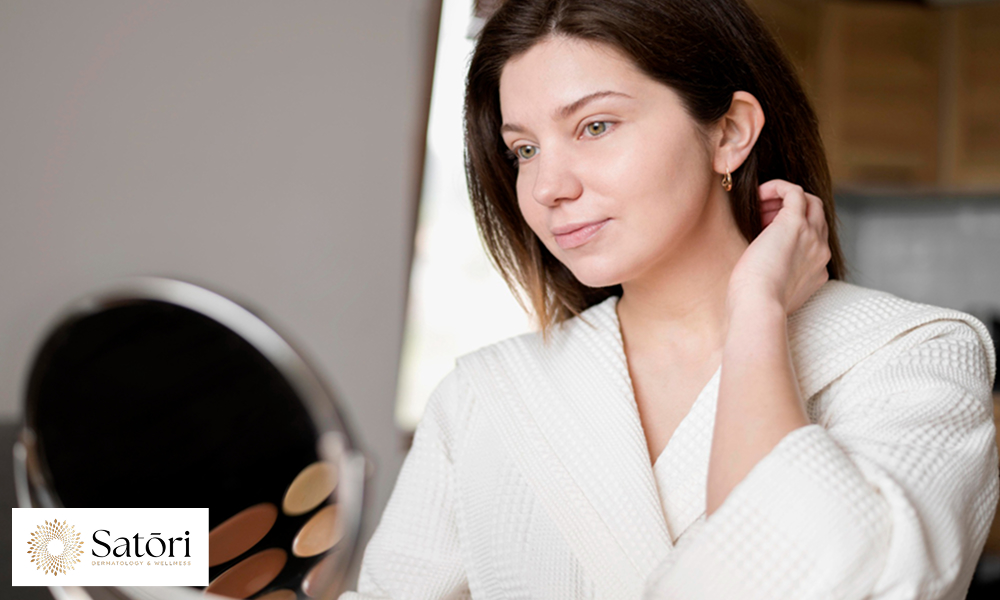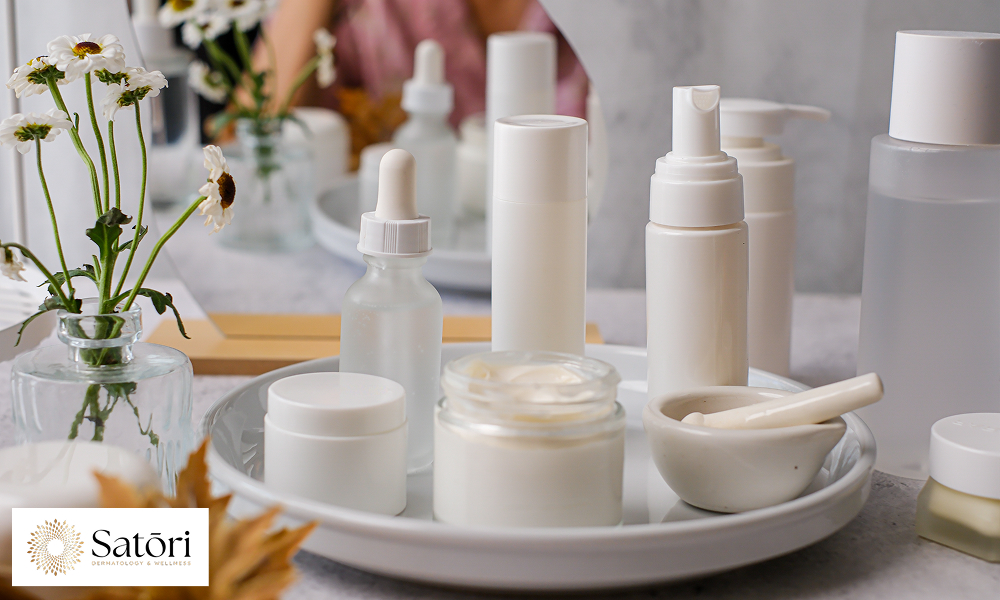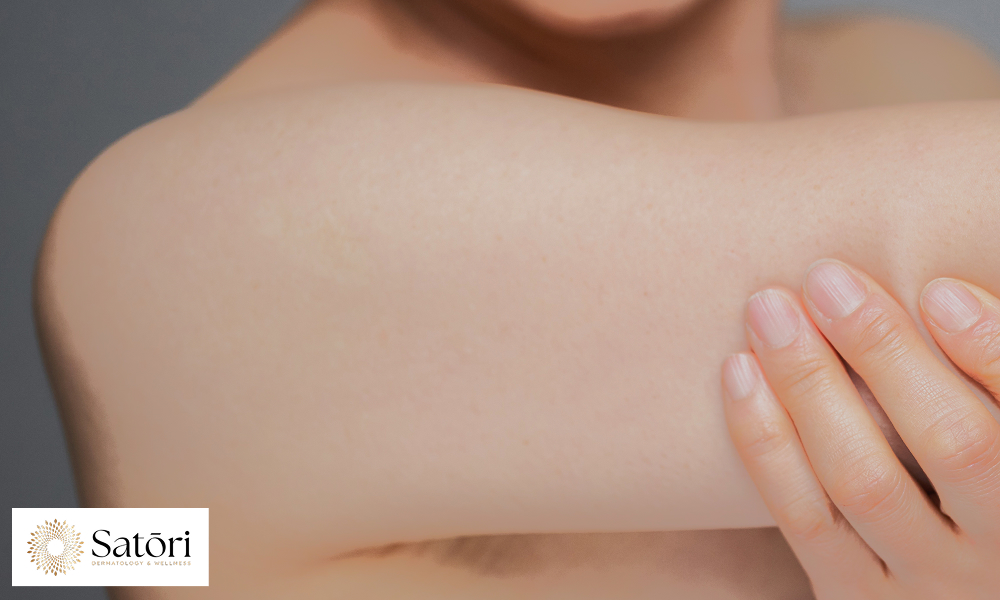Your 30s mark a pivotal decade for your skin. It’s when you start noticing those first fine lines around your eyes, perhaps some dark spots from years of sun exposure, and a general shift in how your skin looks and feels. But here’s the good news: with the right skincare routine, your 30s can be when your skin looks its absolute best.
This is the decade to get serious about prevention while addressing any emerging concerns. Your skin is still resilient enough to respond beautifully to the right products and treatments, but it’s also time to acknowledge that your college skincare regimen won’t cut it anymore.

Understanding Your Skin in Your 30s
During your 30s, several significant changes occur beneath the surface. Collagen production begins to decline by about 1% per year in our mid-20s. This gradual decrease leads to the appearance of fine lines and a subtle loss of firmness that you might start noticing around your eyes and mouth.
Cell turnover also slows down. While your skin renewed itself every 28 days in your 20s, this process now takes closer to 35-40 days. The result? A duller complexion and slower healing of dark spots and sun damage.
Your skin’s natural oil production may also shift. Some people find their skin becoming drier, while others might still struggle with occasional breakouts—a frustrating combination that requires a balanced approach.
The Essential Products for Your 30s
Building an effective skincare routine in your 30s requires eight key products that address both prevention and correction.
A cleanser forms the foundation of any good routine. Look for a gentle face wash that removes dirt, oil, and makeup without stripping your skin’s natural barrier. Cream cleansers work well for dry skin, while gel cleansers suit oilier complexions.
A moisturizer becomes non-negotiable in your 30s. Even if you’ve always had oily skin, proper hydration helps maintain your skin’s barrier function and can actually reduce excess oil production. Look for formulas containing hyaluronic acid, which holds up to 1,000 times its weight in water.
An SPF is your most important anti-aging tool. Broad-spectrum sunscreen with at least SPF 30 prevents further sun damage and protects against UV rays that break down collagen and cause dark spots.
An alcohol-free toner helps balance your skin’s pH and prep it for other products. Modern toners are nothing like the harsh, stripping formulas of the past. Today’s versions hydrate and deliver beneficial ingredients like antioxidants.
An antioxidant serum provides crucial protection against environmental damage. Vitamin C serum is particularly effective, brightening your complexion while stimulating collagen production and fading dark spots.
An eye cream targets the delicate skin around your eyes, where signs of aging typically appear first. The skin here is thinner and more prone to dark circles and fine lines.
An exfoliating acid helps accelerate cell turnover, revealing brighter, smoother skin. Glycolic acid and salicylic acid are excellent choices, depending on your skin type and concerns.
A retinoid cream is perhaps the most powerful anti-aging ingredient available. It boosts collagen production, speeds cell turnover, and can dramatically improve skin texture and tone over time.
Your Morning Skincare Routine
Start your day with a routine focused on protection and hydration.
Begin with your cleanser to remove overnight buildup and prepare your skin for active ingredients. Pat dry gently with a clean towel.
Apply your alcohol-free toner next. This step optimizes your skin’s pH and creates the perfect canvas for your serum.
Follow with your antioxidant serum. Vitamin C serum is ideal for morning use as it provides antioxidant protection against environmental stressors you’ll encounter throughout the day. Allow it to absorb for a few minutes.
Gently pat eye cream around the orbital bone, focusing on areas where you notice dark circles or the first signs of fine lines.
Apply your moisturizer next, choosing a formula appropriate for your skin type. If you have dry skin, opt for something richer. Those with oily skin should look for lightweight, non-comedogenic options.
Finish with SPF as your final step. This is crucial—even on cloudy days, up to 80% of UV rays can penetrate clouds and cause damage.
Your Evening Skincare Routine
Nighttime is when your skin repairs itself, making it the perfect time for active treatments and deeper nourishment.
Start with your cleanser to remove makeup, sunscreen, and the day’s accumulation of pollutants. Consider double cleansing if you wear heavy makeup or live in a polluted environment.
Apply your alcohol-free toner to rebalance your skin after cleansing.
This is when you’ll use your exfoliating acid or retinoid cream, but never both on the same night. These powerful ingredients can cause irritation when combined.
If using an exfoliating acid like glycolic acid or salicylic acid, apply it after toning and allow it to work for the recommended time before proceeding. Start slowly—perhaps twice a week—and gradually increase frequency as your skin adjusts.
On nights when you’re not using an exfoliating acid, apply your retinoid cream. Start with a pea-sized amount for your entire face, and always begin with the lowest concentration to minimize irritation. Retinoids increase cell turnover, which can make the outer layer of skin more vulnerable to UV damage, even though retinoids themselves are not UV-reactive. That’s why they’re best used at night—and always paired with SPF during the day.
Apply your eye cream next, using your ring finger to gently tap the product around your eyes.
Finish with your moisturizer. You might choose a richer formulation for nighttime to provide extra nourishment while you sleep.

Top-Rated Products for Your 30s
Choosing the right products can feel overwhelming with countless options available. Here are some standout formulations that consistently deliver results for people in their 30s.
For Cleansers
CeraVe Hydrating Cleanser offers gentle yet effective cleansing with ceramides and hyaluronic acid. Those with oily skin might prefer Neutrogena Ultra Gentle Daily Cleanser or La Roche-Posay Toleriane Caring Wash for its non-stripping formula.
For Moisturizers
The Ordinary Hyaluronic Acid 2% + B5 is a hydrating serum that draws moisture into the skin and works best when layered under a good moisturizer. Clinique Dramatically Different Moisturizing Gel suits combination skin beautifully, while Drunk Elephant Lala Retro Whipped Cream delivers rich nourishment for dry skin types.
For SPF
EltaMD UV Clear offers broad-spectrum protection without leaving a white cast, making it perfect for daily wear under makeup. Supergoop! Unseen Sunscreen creates an invisible, weightless barrier that works well for all skin tones.
For Alcohol-Free Toners
Paula’s Choice CALM Restoring Toner contains anti-inflammatory ingredients perfect for sensitive skin. The INKEY List Hyaluronic Acid Toner provides an extra dose of hydration while prepping skin for subsequent products.
For Antioxidant Serums
SkinCeuticals CE Ferulic remains the gold standard for vitamin C serum, though it comes with a premium price tag. More budget-friendly options include The Ordinary Vitamin C Suspension 23% + HA Spheres 2% or Mad Hippie Vitamin C Serum with antioxidant-rich botanicals.
For Eye Creams
Olay Eyes Ultimate Eye Cream targets multiple concerns, including dark circles and puffiness. Kiehl’s Avocado Eye Cream provides rich moisture for very dry under-eye areas, while RoC Retinol Correxion Eye Cream offers gentle anti-aging benefits.
For Exfoliating Acids
Paula’s Choice Skin Perfecting 2% BHA Liquid Exfoliant is a cult favorite, particularly for oily or acne-prone skin. It can be used daily by many, but beginners and those with sensitive skin may want to start with every-other-day applications.
For Retinoids
Differin Gel (adapalene) is now available over-the-counter and provides excellent anti-aging benefits. Neutrogena Rapid Wrinkle Repair offers a gentler retinol option for beginners, while SkinMedica Retinol Complex provides professional-strength results.
Addressing Specific Concerns
For Dark Spots and Uneven Skin Tone
Focus on vitamin C serum in the morning and consider adding ingredients like niacinamide or alpha arbutin to your routine. Consistent SPF use is crucial to prevent new spots from forming.
For Dry Skin
Layer your products from the thinnest to the thickest consistency. Look for ingredients like hyaluronic acid, ceramides, and squalane in your moisturizer.
For Sensitive Skin
Introduce new products slowly and patch test everything. Avoid products with fragrances and harsh sulfates. Choose gentler exfoliating acids like lactic acid over glycolic acid.
For Persistent Breakouts
Salicylic acid can help unclog pores, while niacinamide reduces inflammation. Don’t abandon moisturizer; dehydrated skin often overproduces oil to compensate.

The Importance of Consistency
The key to seeing results from your skincare regimen isn’t just using the right products – it’s using them consistently. It takes approximately 28 days to see initial changes and up to three months to see significant improvements in concerns like dark spots or fine lines.
Start slowly when introducing active ingredients like retinoids or exfoliating acids. Your skin needs time to adjust, and patience will be rewarded with better results and fewer side effects.
Don’t Be Afraid to Visit a Dermatologist
While a solid at-home routine forms the foundation of good skin health, there’s immense value in partnering with a dermatologist, especially in your 30s when prevention becomes crucial.
A dermatologist in Franklin, TN, can assess your individual skin type and concerns with trained expertise. They might identify issues you haven’t noticed yet or recommend prescription treatments that are far more effective than over-the-counter options.
Professional treatments like chemical peels, microneedling, or laser therapy can address concerns like sun damage, melasma, or acne scarring more effectively than home treatments alone. These procedures, when performed by qualified professionals, can significantly accelerate your results.
Dermatologists can also prescribe stronger retinoids, hydroquinone for stubborn dark spots, or combination treatments tailored specifically to your skin’s needs. They’ll help you navigate any sensitivity issues and adjust your routine as your skin changes.
Regular skin checks become increasingly important in your 30s, too. Early detection of any concerning moles or growths is crucial for your overall health.
Think of visiting a dermatologist as an investment in your skin’s future. The guidance you receive now can prevent more serious concerns down the road and help you maintain healthy, radiant skin for decades to come.
Love the Skin You’re In—At Every Age
Your 30s are an exciting time for skincare. With the right products and routine, you can address early signs of aging while preventing future damage. Remember that consistency trumps perfection—a simple routine followed religiously will always outperform an elaborate regimen used sporadically.
Listen to your skin and adjust your approach as needed. What works in your early 30s might need tweaking as you approach 40. Stay committed to sun protection, be patient with active ingredients, and don’t hesitate to seek professional guidance when needed.
Your future self will thank you for the skincare habits you establish today.

